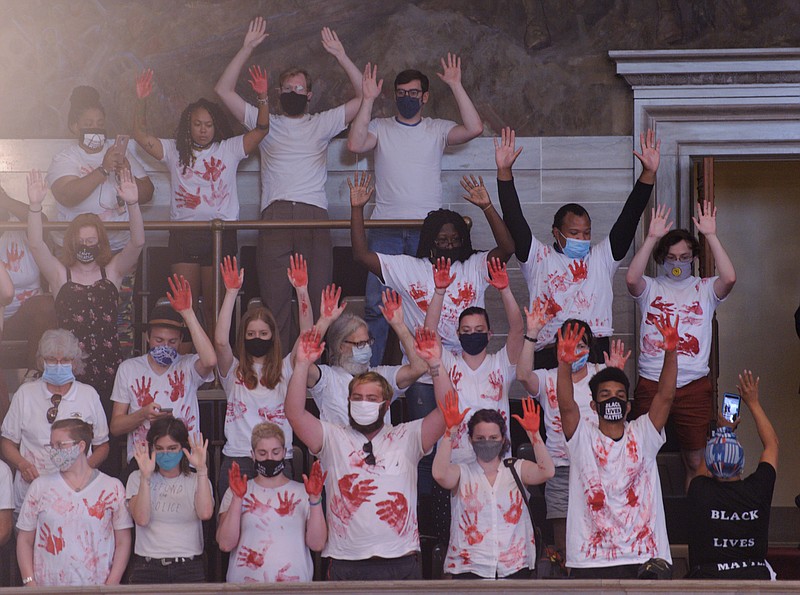Missouri lawmakers hear them, state Rep. Rasheen Aldridge, D-St. Louis, assured a group of protesters seeking criminal justice reform Tuesday at the state Capitol.
Aldridge told members of the ExpectUs group their persistence in arriving at the Capitol, in part to protest Gov. Mike Parson's legislative agenda for a special session, is not going unnoticed.
Aldridge spoke to the group in the Capitol Rotunda after representatives passed five bills Tuesday. The bills would create a pre-trial witness protection fund, prevent the city of St. Louis from imposing residency requirements for police officers and, make it a felony to transfer weapons to children under certain conditions. Another bill, which the House did not pass, would have allowed children as young as 12 to be tried as adults for certain crimes.
Protesters remained mostly quiet during discussions on the House Chamber floor, only showing approval of several comments by snapping their fingers. However, after representatives passed the last of their bills, Ohun Ashe, an ExpectUs organizer, started a chant of "Criminal justice reform - not rhetoric."
Other members of the group unfurled a banner that said, "We see you."
Story continues below video.
Security staff in the Capitol rolled up the banner but returned it to the group after they left the chamber. They unfurled it on the handrail over the first floor of the Rotunda as they gathered again to rally against the legislation.
In St. Louis and Kansas City, there are people who can tell you the effects violent crime has on them, Aldridge told them.
"On the other side of the aisle, you have a governor trying to dictate the way that you live," he said. "Trying to dictate the way that you should be living in the community while you are trying to get your voice heard."
They are trying to incarcerate juveniles, he said, down to age 12.
Aldridge also pointed out Republicans want to remove residency requirements for officers in the city of St. Louis. They believe more police are going to reduce crime, he continued. However, St. Louis has had more police officers, and it has had fewer police officers.
"We still have high crime because we're still not addressing the root cause of the crime that's going on in our cities," Aldridge said.
The protesters should be proud of the work they're doing, he said. Tuesday's protest - called "The People's State of the State Part 4: The Vote" - drew about 60 demonstrators.
Story continues below video.
A couple of weeks ago, the protesters went to the Senate side of the Capitol, he reminded them.
"(Protesters) have been coming to this Capitol because they are sick and tired of politics - it continues to be politics," Aldridge said. "And people are sick and tired of people not getting to the root cause of issues that are going on in our communities."
Urban and rural communities have the same issues, he said. They have hospitals closing, and they have food deserts. They are tired of crime and violence. Education systems aren't at high enough standards. And they don't have jobs that pay livable wages.
However, where the COVID-19 pandemic is having a disproportionate effect on minorities, white people have a different crisis, Aldridge said.
"Opioids - that's their pandemic. That's their crisis," he continued. "It's been a crisis for a while. But it's only when it's affecting certain individuals, then it's a pandemic."
Protesters have to continue to put the pressure on lawmakers, he said.
"This isn't just a Black person movement. This is a multicultural movement," Aldridge said. "This is a white, Black, gay, straight, Christian, Muslim - whatever you are."
State Rep. Peter Merideth, D-St. Louis, said he is angry with what is happening in the state Legislature and across the country. Merideth told the protesters it's difficult to show that anger, but their voices express his pain, frustration and demand for change in a way lawmakers can't.
He thanked them for calling for reform and not rhetoric.
Darryl Gray, an ExpectUs organizer, said lawmakers are not alone in their anger.
"As a Black man, when you listen to a white male representative say that he's angry - if he's angry, try to imagine how we feel," Gray said. "Peter Merideth, a good guy, a white, male representative with all his privilege just think how we feel."
There are challenges in Black communities.
Gray referred to a statement in "Boys in the Hood," in which a character said, "They don't know, and they don't care."
"They know. Even if we invite them to our community - they know. They've read the studies," Gray said. "They've seen the reports. For anybody to think that those folks don't know - that's giving them an out."
They do know the hurt, pain and anguish they're causing, Gray said.

